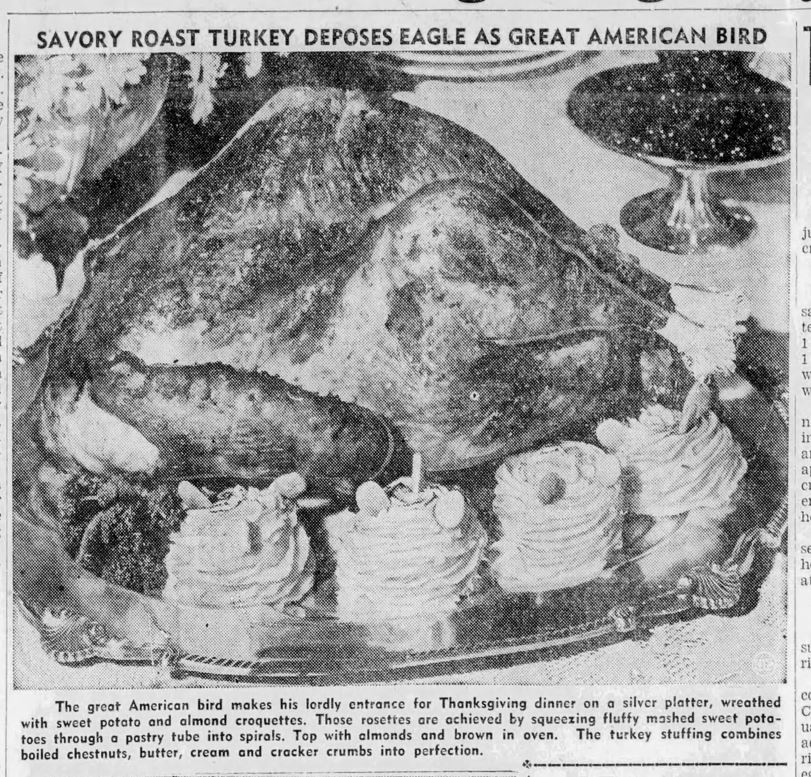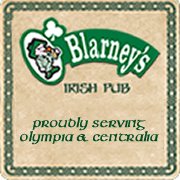The Great Depression was the worst economic disaster in American history. During the 1930s people adapted to difficult times and helped each other as the country tried to recover. Through it all they found reasons to still give thanks at Thanksgiving.
Shopping for Thanksgiving Dinner During the Great Depression
By the Great Depression, the traditional Thanksgiving dinner of turkey, mashed potatoes and cranberry sauce was already well established. “There’s nothing so satisfying,” wrote the anonymous “Doing the Markets with Helen” columnist in 1930, “…as the type of dinner that the Mother of 50 years ago would have served.” After all, she joked, following the turkey feast on Thanksgiving there was “turkey a la disguise” all the next week!
But budgets were tight. Stores tried to tempt customers in. In 1929, the Grand Central Market at Sixth and Columbia Streets, gave away a free turkey every hour from 10 a.m. to 5 p.m. before the holiday. In 1930 they did the same, expanding to have a pre-Thanksgiving Food Show, with demonstrations, deals and other giveaways.
Ice cream was particularly popular for the holiday. The Capital City Creamery, 509 Columbia Street, offered ice cream in the shape of turkeys or with dyed turkey shapes in vanilla bricks as well as special holiday flavors like cranberry sherbet, “T-berry,” and mincemeat. Sevals, 518 Capitol Way, had even more holiday flavors in 1939, including plum pudding, pumpkin and pecan “krunch” made fresh daily.
For those wanting something from the bakery, there were pie and cakes. In 1938 the Daylight Bakery, 307 Fourth Avenue, offered a “Harvest Cake” for 59 cents, a layer spice cake with vanilla buttercream filling, topped with orange fondant and sides covered in toasted coconut.

Hotels offered Thanksgiving meals for those wishing to dine out. They had simple or fancy fare to fit any budget. For example, in 1937 the Capitol Way Inn, 301 East Fourth Avenue, served a Thanksgiving dinner of Louisiana giblet soup, roast Yakima tom turkey, cranberry sauce, candied yams and pumpkin pie for 85 cents.
Community Thanksgiving in Thurston County History
Union, or joint, Thanksgiving services were organized by the Olympia’s Ministerial Association. Bringing together Catholics, Protestants and Jews, they met in local churches and later, in conjunction with the school’s two Hi-Yi clubs, at the Olympia High School.
Groups held inexpensive gatherings and parties. Dances were particularly popular. The Olympia Elks held an annual Thanksgiving “Purple Bubble Ball” in the 1930s, decorating their hall in deep purple, a “mammoth” rotating crystal ball cast light throughout the room, like a proto-disco ball.
Schools also celebrated the holiday in their own way, with parties and programs. In 1937, about 100 junior high school students gathered for a Thanksgiving costume party at the Garfield School. They held a costumed march and contest. One of the winners was dressed as a fisherman! After the contest, students and their families enjoyed a Thanksgiving supper in the cafeteria and held a tap-dancing and musical program.

Out in the county, Miss Mekkes organized for her students a potluck luncheon at the McLane School in 1931. Served by eighth grade girls, students enjoyed wieners, sandwiches, potato salad, cake, Jello, candy, bananas, and apples. The seventh-grade class gave a three-act play, “The Thanksgiving Stocking.”
Another highlight was the annual Olympia High School Thanksgiving football game at Steven’s Field. Often this was against their rival, Shelton High School. The game was held at 11:30 a.m., to leave plenty of time for family get-togethers. Tickets cost 25 cents for students and 50 cents for adults.
Help of Those in Need During the Great Depression
Other groups hosted dinners for those in need. In 1930 the state printing office sponsored a dinner for 400, mainly the unemployed and their families, at the Labor Temple. The Culinary Alliance and Card and Label League ladies served a feast of 28 turkeys for groups of 75 at a time. Other unions contributed the “fixings” and Olympia restaurants offered their ovens for roasting the birds. There was also a musical program in the auditorium.
By the next year, the Depression had worsened and the printers could only donate Thanksgiving baskets through the Red Cross alongside churches and groups like the Camp Fire Girls and Girl Scouts. The Red Cross sent baskets of Thanksgiving dinner supplies to those in need. The Girls Club of Olympia High School filled dozens of baskets, collecting donations from students. The Hi-Yi Club helped with distribution.

Other groups served meals. In 1933, for the example, the Salvation Army provided dinner to 110 people. The Volunteers of America fed 50 at their hall, bringing baskets to two families who were unable to attend.
The children at the Lacey Children’s Farm Home, an orphanage, were also not forgotten. The numbers of children at the institution increased during the Depression as many poor families had no choice but to send their children there. In 1930, the Ladies Aid Society of Ford’s Prairie provided 75 pounds of chicken for Thanksgiving and 15 fruit cakes. The Cowlitz Bend Grange donated cranberries and a case of eggs and the Mooseheart Ladies of Olympia gave pumpkins and eggs to make pies as well as clothing for the 104 children at the home.
The Thanksgiving holiday offered hope during the trials and troubles of the Great Depression. “Thanksgiving is over,” concluded the Olympian in 1933, “leaving a deep sense of gratitude for the year’s blessings and innumerable plates of turkey hash.” Even during the hard times, people could find reasons to be thankful. Happy Thanksgiving!


















































